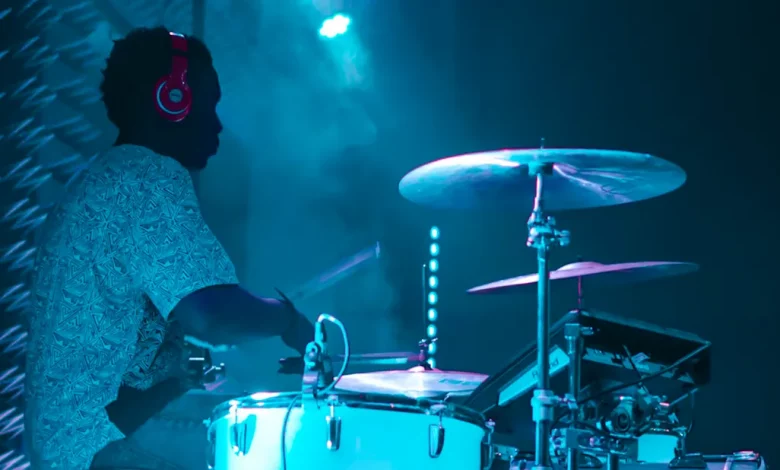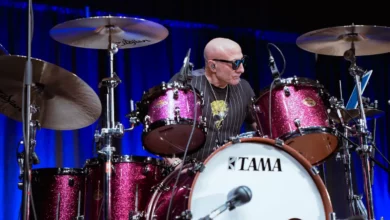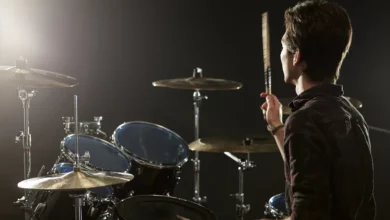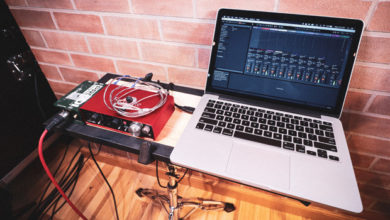
We may earn a commission from the affiliate links on this site. Learn more›
Because sometimes, imagining everyone in their underwear just isn’t enough.
Are you a drummer who suffers from stage fright? Then you’re not alone. I’m a musician with stage fright, too.
My Experience With Performance Anxiety
I remember the first time I ever had a solo performance in public at the age of 13. It was on my first instrument, the flute. As I set up my headjoint and tuned in with my accompanist, the nerves set in.
My hands began getting clammy and slipped around the keys. I looked around in awe at the tall, cathedral-like ceiling as the clamor of voices grew louder and louder and then suddenly stopped. It was show time.
My first bout with stage fright ended far worse than most. A spring popped on the instrument, and every single note sounded like a timid and out-of-tune C#, over and over again. My pianist and private teacher looked up in horror. My legs trembled more as the piece made its way to the second movement—Could I ever make it to the end, or would I simply spontaneously combust, a flutist turned into dust?
Luckily, the crowd was kind about the situation, offering compliments on my tone and even giving the occasional reassuring hug. You’ll find that people are more forgiving about musical mishaps than you think.
As I grew older, my stage fright morphed and changed. I was able to reign it in, bit by bit. But now and then, it still shows up. Stage fright is squirrely and unpredictable like that.
My “stage-fright surprise” was in early college when I learned that performing on different instruments gave me a different type of anxiety. When I performed saxophone for my woodwind prof, I shook so hard I thought I would faint in his office!
On the trombone, my memory tended to slip. During that playing test, I instantly forgot all the embouchure adjustments I had spent hours honing and couldn’t seem to hit any sonically pleasing partial.
And on drums? When I got nervous, I developed a vice grip on the sticks and rushed the notes faster than a New Yorker getting off public transit.
But I learned that this experience wasn’t unique to me either. As my circle of colleagues grew, we began to share stage fright stories. For example, one of my guitarist-buddies told me that he got nervous when switching genres, such as rock to jazz. Changing it up makes musicians feel out of their element and can trigger performance anxiety.
Symptoms of Stage Fright
Stage fright can show up in a plethora of ways, including:
- Dry mouth
- Nausea
- Shaking
- Tension in your body
- Stunted creative processing
- Sweating
- Chills
- Headache
Some of these symptoms sound more like the flu than a case of performance anxiety! Each person’s stage fright can appear differently, and symptoms may vary depending on the day. During solo performances, I get shaky, but during group performances, I get incredibly thirsty!
What Causes Stage Fright?
Stage fright can be caused by our own expectations and the pressure we put on ourselves. Factors that can contribute to the issue include the environment in which you were raised, your biology, and past experiences.
In more severe cases, panic attacks can happen. When we experience stage fright, our brain thinks there is a physical threat, which can elicit a fight or flight response within the body. If you feel on edge, try and use the 54321 method, naming five things you can see, four things you can touch, three things you hear, two things you can smell, and one thing you can taste.
Stage Fright Statistics
According to the National Institute of Mental Health, over 40% of the general population suffers from glossophobia—A fear of public speaking. Sharing your music can be just as nerve-wracking as sharing your words—if not more so. Some studies estimate that over 75% of people fear performing in public, at least to some extent.
A study done by Dr. Gordon Goodman assessed 136 professional actors and musicians and found that 40% of those who have performed on Broadway had stage fright. Professional musicians and hobbyists alike aren’t exempt from the jitters. Studies also show that it doesn’t matter if you are an introvert or an extrovert, either.
Solo performances have been shown to elicit the highest levels of performance anxiety when compared to group acts. Some days, an audience can make me feel on top of the world. The next time, seeing people look at me can have me shaking in my heels so much that I have to switch to flats!
I always find that performing for small crowds is far more difficult than for large audiences. Large crowds feel surreal, and it’s easier for me to step back from them. But intimate crowds? Extremely difficult.
How to Deal With Stage Fright: Body Hacks
- Eat bananas
- Practice in front of a mirror
- Try meditation
- Talk to your doctor
The odd-sounding but-effect body hack of eating bananas helped me get through a nerve-wracking senior recital. Bananas have a lot of potassium, which acts as a natural beta blocker.
When my senior recital was coming up, my professor (the first chair in the TSO) suggested I eat an absurd amount of bananas two days before my performance. “What do bananas have to do with this?!” I wanted to retort. But three bananas a day it was, and it helped.
Other things you can consume to help take the edge off include a double dose of chamomile tea or dark chocolate (which can give your brain a burst of serotonin).
Practicing in front of a mirror can also help desensitize you to the idea of someone watching you. And Zazen, or open-eye meditation, is a calming practice that can be done anywhere, enabling you to center yourself.
But if you find that your stage fright is crippling your creativity, talk to your doctor. Some doctors prescribe beta blockers that work like bananas do but are stronger. Beta-blockers help prevent excess adrenaline. Please note that I’m no expert in medicine, so take these tips with a grain of salt!
Limit Substance Use
Another essential thing when you have stage fright is to make sure you don’t drink or smoke too much—If you decide to use mind-altering substances, do so in moderation. I sound like a stick in the mud but hear me out.
While alcohol is a depressant, drinking too much can alter something called GABA, a neurotransmitter related to anxiety. Similarly, tobacco use has been linked to tension, and cannabis can spur occasional panic attacks.
How to Prepare for Performances
Stage fright isn’t something that can be cured in a weekend. So taking steps to make yourself mentally and physically comfortable when it happens is essential.
- Keep baby powder for clammy hands
- Have fidgets or essential oils on hand
- Practice your parts to the point of memorization
- Imagine yourself making a mistake
Keeping your hands dry will help prevent your sticks from flying away. And while small fidgets like stress balls and spinners sound silly, a little mental distraction/ stimulation can help ease the jitters. I also like to keep a mini bottle of lavender oil to smell.
While imagining yourself making a mistake sounds counterintuitive, it’s not—I’m not talking about contemplating over the errors you’re worrying about.
Imagine yourself messing up when you are in a calm, centered state of mind. It’s not the end of the world if you drop a stick. Would you judge another drummer for dropping a drum stick if their entire set was stunning? Exactly.
Drummers With Stage Fright
Some big-name drummers who have struggled with stage fright include Mark Shulman, Taylor Hawkins, David Weckl, and Anika Nilles.
Mark Shulman (P!NK, Cher) has performed for over 1 billion people and says that all performances can be broken down into the following categories: clarity, capability, and confidence. His book Conquering Life’s Stage Fright is an excellent read for drummers and public speakers.
Taylor Hawkins (the late drummer from Foo Fighters) struggled with stage fright frequently, and many people didn’t know it. Hawkins once said post-pandemic performances made him feel like he was “in hell” during one Rolling Stone Magazine interview.
World-famous Anika Nilles wrote an article with Drumeo a few years back detailing her stage fight. She said that she used to cover the windows to her practice room so no one would see her, and even reported that she had difficulty accepting compliments because of her performance anxiety.
Other well-known musicians with stage fright include Adele, Rihanna, Van Halen, Andrea Bocelli, Elvis Presley, Lady Gaga, Ozzy Osbourne, Ella Fitzgerald, and Paul McCartney.
Stage Fright Doesn’t Have to Stop the Show
The above musicians proved that experience doesn’t make stage fright disappear but that you can still have a successful career if you take the time to wrangle your inner monkeys. So be sure to let me know how the above tips and tricks work for you when you’re in the spotlight!



